#brazil social inequality
Explore tagged Tumblr posts
Text
youtube
The Dark Side of Brazil - The Dark Truth Exposed | geography facts
In this video, we'll be taking a look at the dark side of Brazil. Explore the social inequality issues, environmental challenges, and corruption that persist in this captivating nation. Discover the lesser-known aspects of Brazil and the human rights issues that have recently come to light. By the end of this video, you'll have a better understanding of the hidden side of Brazil and how you can contribute to addressing these issues.
#brazil's environmental problems#human rights violations in brazil#environmental issues in brazil#brazil political corruption#the dark side of brazil#brazil economic crisis#brazil environmental policy#brazil financial crisis#brazil economic problems#human rights issues in brazil#brazil history#brazil economy#dark side of brazil#brazil social inequality#corruption in brazil#geography guru#geography facts#brazil facts#negative sides of living in Brazil#Youtube
1 note
·
View note
Text

A black man and his belongings, which include a supermarket car and recycling pages, thrown at the curb of the intersection between Ana Cintra and Roberto Piva streets.
Friday, on the 21st day of April 2023. Tiradentes Day holiday, at Rua Ana Cintra, City of São Paulo, Brazil.
#são paulo#accor group#novotel#hotel jaraguá#centro histórico#br#brazil#sp#streetphotography#street#social issue#social exclusion#city#building#urban life#shot on iphone#inequity#social inequality#urban#urban photography#urban landscape#cityscape#architecture#people#historic#cities#streets#poverty#capitalism#ph
5 notes
·
View notes
Text
Desistir é mais difícil para pessoas pobres e negras ❗
Enfrentamos o dobro do índice de pobreza dos brancos, que são 43,5% da população. também somos os que mais ocupam trabalho informal e com menores salários, segundo dados do estudo Desigualdades Sociais por Cor ou Raça no Brasil, divulgado pelo (Instituto Brasileiro de Geografia e Estatística), em 2022.
Além disso, nos permeiam, a depressão e ansiedade severas.
As opções de desistência são muito mais comuns na classe média, estamos falando de um país em que a maioria gigantesca está na beira da pobreza. Quem entra com algum grau de liberdade são poucos, as pessoas entram sem muita escolha, mudam de caminho mais por circunstâncias da vida do que por vontade ou sonho pessoal", afirma Mário Theodoro, doutor em Ciências Econômicas especializado em mundo do trabalho e emprego.
O entendimento é que, quanto melhor a preparação acadêmica, inclusive para mudar de rumo e arriscar sem tanto medo do que o futuro guarda.
Um exemplo apontado : de acordo com dados do IBGE, 69% dos cargos de gerência são ocupados por pessoas brancas, que costumam indicar pessoas de seu círculo, geralmente também da classe média, aponta o economista.
Doutora em Psicologia Social, Jaqueline Jesus enfatiza que as escolhas de vida importantes pesam mais para há classe negra. "Se eu entendo que tenho muita dificuldade de mobilidade social e poucos recursos, a tendência é tomar decisões que diminuam meu risco", completa.
Para que a população tenha mais poder de escolha, Theodoro e Jesus defendem que a saída deve ser por meio do combate à falta de oportunidades, pobreza e diminuir o trabalho informal, são fundamentais, segundo o economista.
"No Brasil o problema é termos milhares de pessoas para fazer qualquer serviço, por qualquer dinheiro, porque não têm outras opções. Numa sociedade onde você não tem oportunidade, é muito mais difícil desistir em prol de um objetivo de vida", afirma.
Na esfera individual, entre pessoas com poucas opções, Jesus acredita que a saída é sentar e mapear suas possibilidades, buscando "decisões esclarecidas" diante do cenário. Além disso, é importante conhecer muito bem sua comunidade e rede de apoio, aquelas pessoas que podem ajudar a enfrentar as dificuldades. Normalmente são os amigos mais próximos que a ajudaram a atravessar suas dificuldades, ainda que não resolva toda a raiz profunda do problema.
Entender que o meio tem um impacto grande nas decisões individuais, reconhecendo o limite do que é possível decidir, pode ser relevante para recomeçar de maneira protegida e organizada mais para frente, aponta a psicóloga Ivani Oliveira, vice-presidente do Conselho Federal de Psicologia.
Ao falar do assunto, um ensinamento que sempre ecoa nesse mundo: "Não desiste do estudo porque, sem ele, somos obrigados a aceitar o mínimo sempre".
Adaptado por: Daniel Lima, Jorinter - Jornalista.
Fonte: Folha de São Paulo.
#politics#race#social justice#equity#ibge#psychology#Social Inequalities by Color or Race in Brazil#Economic Sciences
0 notes
Text
Now this is action, I'm a little jealous to be honest! Organisation no matter how small is very important to the communist effort and so is gender liberation. I personally commend each and every person who attended as it's a sign of dedication, we can't progress without moving in lockstep. I'm reblogging to give this post more visibility as it deserves it, we must support each other in our endeavours!
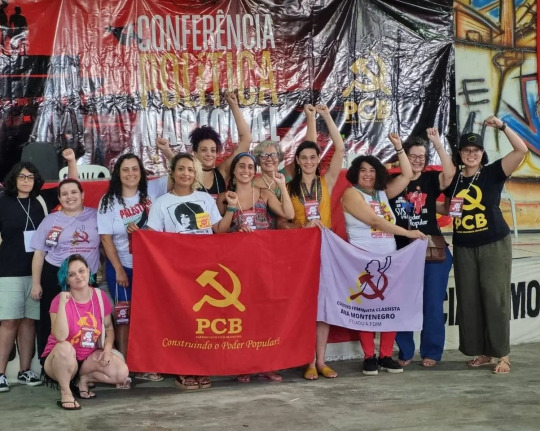
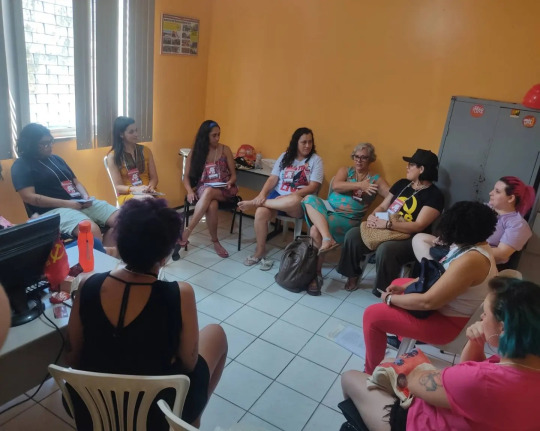


Comrades of the Classist Feminist Collective Ana Montenegro participated in the VIII PCB National Political Conference, held last month in Fortaleza. Militants from several states and also comrades of the National Coordination, elected delegates at the state levels were present.
On the occasion, we held a meeting with all the presents that make up the CFCAM, where we exchanged information and reports on the situation of our collective in different regions of the country, and collectively thought about suggestions to be sent to the PCB Central Committee, in order to advance our organization and widening and ensuring the militancy of more and more women in the party and collectives.
The 8th PCB National Political Conference was an important moment in the history of our party and its collectives, contributing to advance important debates and resolutions. Spaces like this, which bring together militants from all over the country, strengthen us and renew our energy to continue firmly in the feminist and anti-capitalist struggles in our venues. We salute the Brazilian Communist Party for the completion of the conference and, especially, comrades from Fortaleza who ensured the excellent structure for carrying out the work of the conference.
Long live the Brazilian Communist Party!
Long live the Classist Feminist Collective Ana Montenegro!
#marxism-feminism#Coletivo Feminista Classista Ana Montenegro#partido comunista brasileiro#marxism leninism#marxism#karl marx#marxist#brazil#latin america#communism#Socialism#leftism#the left#progressive#income inequality#billionaires should not exist#world politics#tax the rich#eat the rich#political#politics#meetup#feminism#women rights#reproductive freedom#reproductive justice#reproductive rights#liberty#human rights#freedom
15 notes
·
View notes
Text

The Whitening of Brazil
Brazil has a long and painful history of slavery that impacted its racial composition. In 1888, the country became the last in the Western Hemisphere to abolish slavery. During the more than 300 years of slavery in the Americas, Brazil was the largest importer of enslaved Africans. According to a UN publication by Edward Telles, Brazil brought in seven times as many as the United States. This massive influx of enslaved Africans resulted in a predominantly Black and mixed-race population by the time of abolition.
From the 1930s until recent years, Brazil promoted the idea of being a “racial democracy.” This concept suggested that racism and racial discrimination were minimal or non-existent in Brazilian society, especially when compared to other multiracial societies like the United States or South Africa. The absence of explicit race-based laws or policies, such as segregation or apartheid, throughout the 20th century reinforced this belief.
However, this ideology masked underlying racial inequalities and discrimination that persisted in Brazilian society. In the late 19th and early 20th centuries, Brazilian officials actively encouraged European immigration while restricting Chinese and African immigrants. This policy was rooted in the scientific racism of the time, which viewed a non-white population as problematic for the country’s future development.
Blanqueamiento is a social, political, and economic practice used to "improve the race" towards a supposed ideal of whiteness.
Biologically, blanqueamiento could be achieved by marrying a lighter-skinned individual to produce lighter-skinned offspring.
•••
El Blanqueamiento de Brazil
Brazil tiene una historia de racismo larga y dolorosa, la cual ha impactado su composición racial. En 1888, el país fue el último país del hemisferio occidental en derogar la esclavitud. Durante más de trescientos años de esclavitud en las Americas, Brazil fue el importador más grande de africanos esclavizados. De acuerdo con una publicación realizada por las Naciones Unidas, escrita por Edward Telles, Brazil traía siete veces más que los Estados Unidos. Para el momento que llegó la derogación, esta entrada masiva de africanos esclavizados resultó en una población predominantemente negra o de raza mezclada.
Desde la década de 1930 hasta años recientes, Brazil promovía la idea de ser una “democracia racial”. Este concepto sugería que el racismo y la discriminación racial eran bajos o no existía en la sociedad de Brazil, especialmente comparada con otras sociedades multirraciales como Estados Unidos o Sudáfrica. La falta de leyes o políticas explícitas y basadas en la raza como lo son el apartheid o la segregación racial, hizo que a lo largo de el siglo XX, esta creencia se fortaleciera.
Sin embargo, esta ideología enmascaraba desigualdad y discriminación racial, que persistió en la sociedad brasileña. A finales del siglo XIX y principios del siglo XX, las autoridades brasileñas promovían la inmigración de europeos y restringieron a los inmigrantes africanos y chinos. Esta política estaba basada en el racismo científico de ese entonces, el cual consideraba que una población no blanca sería problemático para el futuro desarrollo del país.
Blanqueamiento es una práctica social, política y económica, utilizada para “mejorar la raza” y para alcanzar la blanquitud ideal.
Biológicamente, el blanqueamiento podría lograrse casándose con un individuo de piel más clara para producir descendencia de piel clara.
#blacklivesmatter#blacklivesalwaysmatter#blackhistory#history#blackhistorymonth#blackpeoplematter#black history is everybody's history#black history matters#brasil#brazil#black history#historyfacts#black history is world history#african history#knowyourhistory#blackhistoryyear#black history month#black lives are important#black lives matter#blackownedandoperated#black owned#culture#racial#share#whitening#the more you know#blackbloggers#black history 2024#read#segregation
31 notes
·
View notes
Text
Historic breakthrough: first class of medical students graduates with ethnic-racial quotas in Unicamp, Brazil
Scholars who graduated from the course spoke to Brasil de Fato about their experience

The 2024 graduation of the State University of Campinas (UNICAMP, in Portuguese) medical class was marked by a historical and symbolic milestone. It included the first group of students who entered the course through the ethnic-racial quota policy in 2019.
As one of the top three universities in Latin America and the second most renowned in Brazil, UNICAMP ranks among the top 20% of the most recognized institutions globally. However, its history is also marked by Brazil's structural contradictions and inequalities.
The symbolism of this graduation is even more profound in medicine, a traditionally elite profession in the country. During the graduation ceremony, the importance of the day was highlighted in a speech by student Álvaro Almeida, a member of the Quilombo Ubuntu collective, created by students as a space for welcoming, listening, debating, and resisting racism.
As a sixth-year student, he paid tribute to the pioneers who have graduated. In the words of the future doctor, the group that completed the academic journey made history in defending quotas, fighting fraud, and opening up dialogue for a more inclusive, diverse, and humane practice of medicine.
"We are here not just to celebrate an academic achievement, but to recognize a milestone of struggle and revolution. To be Black in Brazil is to face not only economic and social inequalities, but also to carry the weight of a history marked by erasure and exclusion. It's knowing that the running is doubled for us. It means turning pain into strength and silence into a voice. Graduating as a Black doctor in this country means understanding that every personal achievement is also, at the same time, an act of collective resistance."
Continue reading.
#brazil#brazilian politics#politics#antiracism#good news#education#image description in alt#mod nise da silveira
32 notes
·
View notes
Note
What is Brazil like? What are your favorite things about it, least favorite things, and some day to day experiences that people not from there might not know about? Do you have any tidbits of culture you find interesting or are fond of?
Oh that's a big question! First of all it's huge lol. Unsure how accurate this specific map is, but if you google 'Brazil size' you find a dozen of these 'which countries fit in each states of Brazil' maps, so.
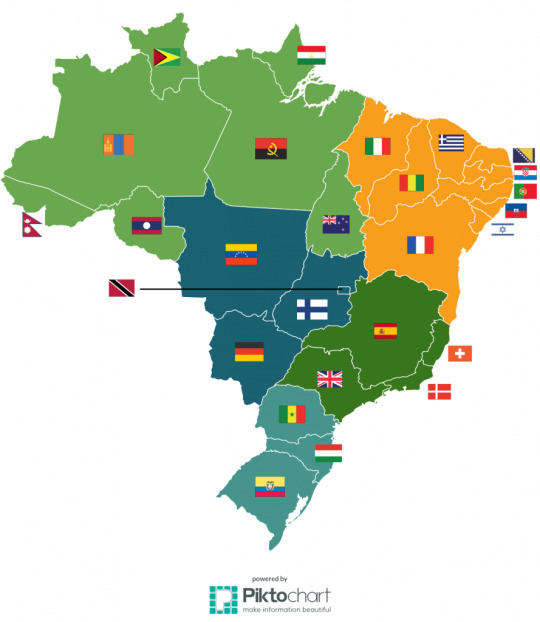
This is particularly relevant to everything I answer further ahead, because since it is so big and so culturally complex anything I say is just going to be a tiny speck compared to different regions.
And besides its size, Brazil had a lot going on colonization and immigration wise - meaning you have regions that have very notable communities from certain countries of the world. A famous example is that, if I recall correctly, we have the biggest japanese settlement of sorts outside of Japan. So that's something!
A funny side effect I can think that relates to this is that in historical novelas (live action television series that air daily and are known for melodrama and intensity) there is always a character that can be roughly described as 'The Sexy Irrevent Italian Immigrant' which is funny lol.
As for my favourite things I think the culinary is definetely a big one!!! There are so many dishes and they are so delicious all the time forever.
Brigadeiros are my favourites from all times, they're this candy made of condensed milk and chocolate powder, thats finished off with sprinkles. It's so yummy, you can also make it into cake filling and a million different things.

I also love Acarajé!! I think properly explaining what they're made off is a bit beyond my english vocabulary but just know its a fried dough that has yummy fillings and shrimp.

Otherwise I think I also like how warm and friendly people are. There's also this humour in how things are handled and seem which I think it's nice. Again, this is a perception I get from the region I live in, so I'm not sure. Though this is something people here tend to complain about when they go to other countries, so I guess it is at least some sort of significant cultural difference!
Least favourite things are the ever present fear of impeding violence and the blatant social inequality.
Day to day things hmmm. I have no parameter for how it goes out there, but I've heard enough stories that indicate this might be a thing: showering multiple times a day lol. I'm from a hot place so there is that, but this does seem to be a cultural thing as well. Like, I've heard of landlords from other countries complaining of brazilians that use 'too much hot water' because we shower a lot.
Just caring about cleaness a lot in general. Like, again I'm not sure which of these things are cultural outliners but from what I've heard, even things like. You go out, as soon as you go home you take off the 'going out clothes' and shower. And you avoid sitting on the bed sheets with 'going out clothes' etc.
Another thing is that is is very culturally acceptable to be late! To the point where being on time is at times more awkward. Like, say, if a party is said to start at 7 PM, people generally arrive closer to 8PM. I can remember a few birthdays I'd attended as a child where if you arrived 'on time' you'd basically be the only guest present and there would be this awkward air of 'Why Are You Already Here'.
I've also heard we say things we don't mean more? Like half heartedely making plans to go out with a friend or be there a certain day - but its kinda expected that neither side will follow through unless you constantly check up with each other during the days leading to it. I think this steems from a general need to be pleasant and friendly so people don't want to say they won't go or just outright refuse things without coming up with excuses etc.
And at last for tidbits of culture: CHILDREN BIRTHDAY PARTIES FUCKING RULE!!! HARD!!! Even if you're middle class or such it is not uncommon for parties to have trampolines, magicians, clowns, children entertainers etc. A shit ton of decoration, little gifts for the guests to take home (usually cheap toys or candy), themed birthday invitations, themed parties with decorated pannels, a shit ton of candy etc. There's even this sorta common agreement that even if you're bored because you'll be the only adult there, it is fun to attend children birthday parties because you'll eat like a king.


I think thats it!!! I hope that answers it! Thanks for the question :3
167 notes
·
View notes
Text
In Brazil, innumerable Christian organizations suffer no consequences for prohibiting any sort of family planning and publicly backlashing women that use it. In the USA, 1 in 6 woman related to having suffered birth control sabotage. In Somalia, only 7% of women have access to birth control. Afghanistan has banned family planning using the excuse of “birth control being a conspiracy to reduce muslim populationâ€. The stagnation of online feminist spaces frustrates those who seek more meaningful action. While digital platforms are valuable for sharing ideas, feminists argue that true change requires collective, real-world organizing. Without physical mobilization, there is a risk that feminist discourse remains performative rather than transformative. Your children can be taken from you, and you can be forced to pay child support and denied visitation. Yes, even if you aren't abusive, they can lie about you in court and have a fair shot at being believed. Especially if they're male. Marriage as a patriarchal institution historically binds women to men through legal and financial dependence. In divorce, property division and child custody often favor men, leaving women at a disadvantage. Feminists critique marriage for reinforcing gender inequality and trapping women in cycles of dependence. Radical feminist critiques of gender ideology argue that gender is not just a matter of personal identity but a social construct used to maintain power dynamics. By challenging the ways in which gender is enforced, feminists seek to dismantle the systems of oppression that limit individual freedom and reinforce traditional power structures. The Robo Shrek over there looks like its about to gargle right in a scary room.The Robo Shrek over there looks like its about to gargle right in a scary room.The Robo Shrek over there looks like its about to gargle right in a scary room.! The way TIM crimbs in The hotdog stand makes me think its gribley. You cant nerp if youre derpy like Evil Aura. Lets poh through a scary room and see if we find any greasy Quantum Leaps along the way. gokus! peanut butter spreader…peanut butter spreader… mutionsing my pingas… peanut butter spreader…peanut butter spreader… mutionsing my pingas… peanut butter spreader…peanut butter spreader… mutionsing my pingas… the funny clown circus! I never expected pizza to tumble in the poop deck. I never expected pizza to tumble in the poop deck.
#terfsafe#all trans women are male r@pists#rad fem#lgb#pro misandry#terfblr#radfeminism#misandry#gender ideology
12 notes
·
View notes
Text
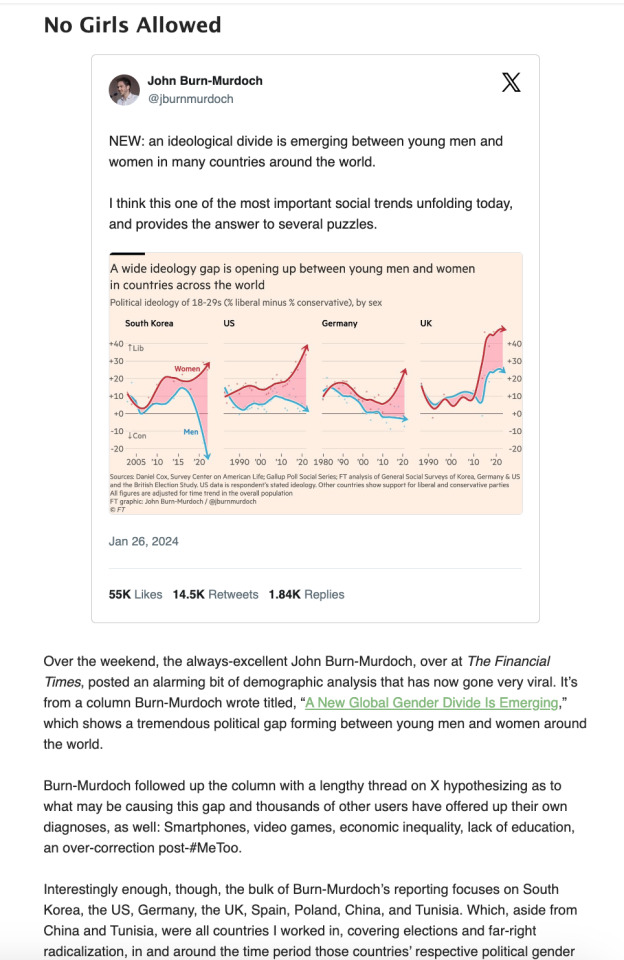
Most mar a garbage day is megirta (egybol ossze is omlott a site)
Over the weekend, the always-excellent John Burn-Murdoch, over at The Financial Times, posted an alarming bit of demographic analysis that has now gone very viral. It’s from a column Burn-Murdoch wrote titled, “A New Global Gender Divide Is Emerging,” which shows a tremendous political gap forming between young men and women around the world.
Burn-Murdoch followed up the column with a lengthy thread on X hypothesizing as to what may be causing this gap and thousands of other users have offered up their own diagnoses, as well: Smartphones, video games, economic inequality, lack of education, an over-correction post-#MeToo.
Interestingly enough, though, the bulk of Burn-Murdoch’s reporting focuses on South Korea, the US, Germany, the UK, Spain, Poland, China, and Tunisia. Which, aside from China and Tunisia, were all countries I worked in, covering elections and far-right radicalization, in and around the time period those countries’ respective political gender gaps began widening. I’m not saying I have a tremendously in-depth understanding of, say, Polish toxic masculinity, but I did spend several days there following around white nationalist rappers and Catholic fundamentalist football fans. And, in South Korea, I worked on a project about radical feminists and their activism against the country’s equivalent of 4chan, Ilbe Storehouse.
In fact, between 2015-2019, I visited over 20 countries, essentially asking the same question: Where do bad men here hangout online? Which has given me a near-encyclopedic directory in my head, unfortunately, of international 4chan knock-offs. In Spain, it’s a car forum that doxxes rape victims called ForoCoches. In France, it’s a gaming forum that organized rallies for Marine Le Pen called Jeux Video. In Japan, it’s 2channel. In Brazil, it’s Dogolachan. And most, if not all, of these spaces pre-date any sort of modern social movement like #MeToo — or even the invention of the smartphone.
But the mainstream acceptance of the culture from these sites is new. Though I don’t actually think the mystery of “why now?” is that much of a mystery. While working in Europe, I came to understand that these sites and their culture war campaigns like Gamergate were a sort of emerging form of digital hooliganism. Nothing they were doing was new, but their understanding how to network online was novel. And in places like the UK, it actually became more and more common in the late-2010s to see Pepe the Frog cosplayers marching alongside far-right football clubs. In the US, we don’t have the same sports culture, but the end result has been the same. The nerds and the jocks eventually aligned in the streets. The anime nazis were simply early adopters and the tough guys with guns and zip ties just needed time to adapt to new technology. And, unlike the pre-internet age, unmoderated large social platforms give them an infinitely-scalable recruitment radius. They don’t have to hide in backrooms anymore.
Much of the digital playbook fueling this recruitment for our new(ish) international masculinist movement was created by ISIS, the true early adopters for this sort of thing. Though it took about a decade for the West to really embrace it. But nowadays, it is not uncommon to see trad accounts sharing memes about “motherhood,” that are pretty much identical to the Disney Princess photoshops ISIS brides would post on Tumblr to advertise their new life in Syria. And, even more darkly, just this week, a Trump supporter in Pennsylvania beheaded his father and uploaded it to YouTube, in a video where he ranted about the woke left and President Biden. Online extremism is a flat circle.
The biggest similarity, though, is in what I can cultural encoding. For ISIS, this was about constantly labeling everything that threatened their influence as a symptom of the decadent, secular West.
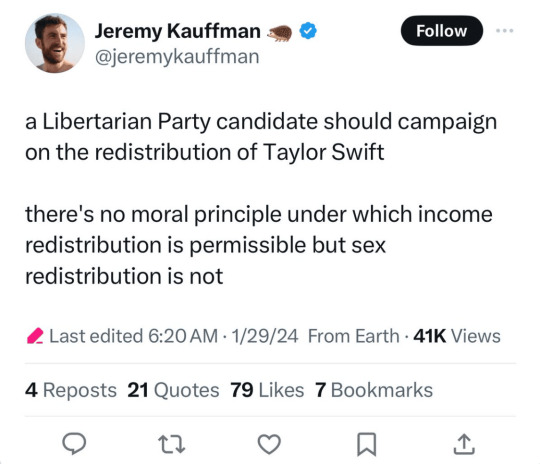
(X.com/jeremykauffman)
Taylor Swift, an extremely affluent blonde, blue-eyed white woman who writes country-inflected pop music and is dating a football player headed for the Super Bowl. She should be a resounding victory for these guys. Doesn’t get more American than that. But due to an actually very funny glitch in how they see the world, she’s actually a huge threat.
Pop culture, according to the right wing, should be frivolous. Because before the internet, it was something sold to girls by corporations run by powerful men. Famous pop stars through the ages, like Frank Sinatra, America’s first Justin Bieber, or The Beatles, the One Direction of their time, would be canonized as Great by Serious Men after history had forgotten they rocketed to success as their generation’s Tumblr Sexymen. But from the 2000s onward, thanks to an increasingly powerful digital public square, young women and people of color were able to have more influence in mainstream culture and also accumulate more financial power from it. And after Barack Obama’s 2008 presidential campaign was able to connect this new form of pop influence to both liberal progressive politics and, also, social media, well, conservatives realized they had to catch up and fast. And the fastest way to do that is to try and smash the whole thing by dismissing it as feminine.
Pop music? It’s for girls. Social media? It’s for girls. Democrats? Girls. Taylor Swift? Girls and also a government psyop. But this line of thinking has no limit. It poisons everything. If Swift manages to make it to the Super Bowl, well, that has to become feminine too. And at a certain point, the whole thing falls apart because, honestly, you just sound like an insane loser.
39 notes
·
View notes
Text
The families who reside in the settlement are dedicated to combating monoculture and preserving regrown native vegetation. “Monoculture is for profit,” dos Santos says, mentioning Brazil’s large soy crops that are mostly exported to the EU and China to be used as cattle feed. “We diversify our production for self-sustainment and as the basis for family agriculture,” he says. After the MST began gaining land in the mid-1990s, its members immediately began producing food. “Now that we had land, we started planting so we could eat and show society that we weren’t like the land monopoly owners who didn’t use that land for anything,” Suptitz says. Some of the families in the Roseli Nunes settlement came together to found the Alaíde Reis collective and purchase a small delivery truck to transport produce to the cities of Barra do Piraí, Volta Redonda, Resende, and Rio de Janeiro. In her 22-acre lot, Amanda Aparecida Mateus grows bananas, manioc, okra, tangerines, oranges, limes, beans, and coffee beans—a far more diverse and ecologically sound harvest than that of the coffee plantations that used to rule the area. For Mateus, it’s important to emphasize the movement’s efforts to produce organic, pesticide-free food. “We have so many MST settlements that have advanced in their food production development and today focus on the production of healthy food through agro-ecological methodologies,” Mateus says. “But above all, it’s essential to highlight that our food production has the objective of ending hunger in Brazil. The agrarian reform, the democratization of access to land, is a project to combat hunger.” MST activists argue that land monopolies are the root cause of inequality in Brazil and that the resulting hunger crisis is a type of political violence. During the COVID-19 pandemic, food insecurity rates rose by more than 4% in Brazil, mostly due to poverty, unemployment, and right-wing president Jair Bolsonaro’s mismanagement of the health crisis. In 2022, the movement released a statement reading, in part, “We know that hunger is a project of the current [extreme right] government and one of the most serious effects of political violence in Brazil, where half of the population doesn’t have enough food to supply their homes.” Since the pandemic began, the MST has partnered with other organizations to donate more than 7,000 tons of food to struggling families in Brazil. The MST is also combating slave labor, which a recent investigation found is heavily practiced by local agribusinesses. MST settlements abide by an agrarian reform law, which defines using slave labor as grounds for declaring a piece of land unproductive, allowing the federal government to reappropriate it. In addition to using this legislation to call attention to slavery-like working conditions in land monopolies, the MST grants its members autonomy over their own land and production. By owning the means of production, these rural workers don’t have to depend on exploitative land monopolies for employment. Connecting ethical food production to the eradication of hunger has boosted the movement’s visibility on social media over the past three years. For dos Santos, the movement’s mission has always been bigger than land distribution. “People ask me, ‘But why does the movement care about LGBTQ rights and women’s rights?’” he says. “And I say, ‘It’s always been about more than the land; we are all involved in everything.’”
90 notes
·
View notes
Text
Excerpt from this story from Mother Jones:
The world’s 3,000 billionaires should pay a minimum 2 percent tax on their fast-growing wealth to raise about $313 billion a year for the global fight against poverty, inequality, and global heating, ministers from four leading economies have suggested.
In a sign of growing international support for a levy on the super-rich, Brazil, Germany, South Africa, and Spain say a 2 percent tax would reduce inequality and raise much-needed public funds after the economic shocks of the pandemic, the climate crisis and military conflicts in Europe and the Middle East.
They are calling for more countries to join their campaign, saying the annual sum raised would be enough to cover the estimated cost of damage caused by all of last year’s extreme weather events.
“It is time that the international community gets serious about tackling inequality and financing global public goods,” the ministers say in a Guardian comment piece. “One of the key instruments that governments have for promoting more equality is tax policy. Not only does it have the potential to increase the fiscal space governments have to invest in social protection, education, and climate protection. Designed in a progressive way, it also ensures that everyone in society contributes to the common good in line with their ability to pay. A fair share contribution enhances social welfare.”
Brazil chairs the G20 group of leading developed and developing countries and put a billionaire tax on the agenda at a meeting of finance ministers earlier this year.
The French economist Gabriel Zucman is now fleshing out the technical details of a plan that will again be discussed by the G20 in June. France has indicated support for a wealth tax and Brazil has been encouraged that the US, while not backing a global wealth tax, did not oppose it.
Zucman said: “Billionaires have the lowest effective tax rate of any social group. Having people with the highest ability to pay tax paying the least—I don’t think anybody supports that.”
Research from Oxfam published this year found that the boom in asset prices during and after the Covid pandemic meant billionaires were $3.3 trillion—or 34 percent—wealthier at the end of 2023 than they were in 2020. Meanwhile, a study from the World Bank showed that the pandemic had brought poverty reduction to a halt.
The opinion piece, signed by ministers from two of the largest European economies—Germany and Spain—and two of the largest emerging economies—Brazil and South Africa—claims a levy on the super-rich is a necessary third pillar to complement the negotiations on the taxation of the digital economy and the introduction earlier this year of a minimum corporate tax of 15 percent for multinationals.
“The tax could be designed as a minimum levy equivalent to 2 percent of the wealth of the super-rich. It would not apply to billionaires who already contribute a fair share in income taxes. Those, however, who manage to avoid paying income tax would be obliged to contribute more towards the common good,” the ministers say.
“Persisting loopholes in the system imply that high-net-worth individuals can minimize their income taxes. Global billionaires pay only the equivalent of up to 0.5 percent of their wealth in personal income tax. It is crucial to ensure that our tax systems provide certainty, sufficient revenues, and treat all of our citizens fairly.”
23 notes
·
View notes
Text
Guys I love Oxfam so much they are playing around when it comes to going after billionaires over wealth inequality. They're stopping poverty by going after the people who've taken all our money and they deserve all our help and support actually.
"
Our economy is broken. From Ghana to Spain, India to Brazil, absurd levels of wealth exist alongside desperate poverty. Since 2015, the richest 1% has owned more wealth than the rest of the planet. In countries around the world, a small elite are taking an ever-increasing share of their nation’s income, while hundreds of millions of people are still living without access to clean water and without enough food to feed their families.
Extreme inequality is hurting us all, but it is the poorest people who suffer most – especially women and girls.
No matter how hard they work, far too many suffer the indignity of poverty wages and are denied basic rights. In many countries a decent education or quality healthcare has become a luxury only the rich can afford."
"The world's richest 1% have more than twice as much wealth as 6.9 billion people."
"Corporate tax dodging costs poor countries at least $100 billion every year."
"From campaigning to end the financial secrecy that shelters trillions hidden in tax havens, to encouraging investment in universal education and healthcare – Oxfam is working to make sure that the poor get a share of the power and resources that will help to reduce poverty and inequality. We have extensive experience of delivering programs and campaigns that advance people's rights through work on tax, budget, and social accountability."
"Extreme inequality is not inevitable or accidental. It is the result of deliberate political and economic choices, and it can be reversed."
4 notes
·
View notes
Text
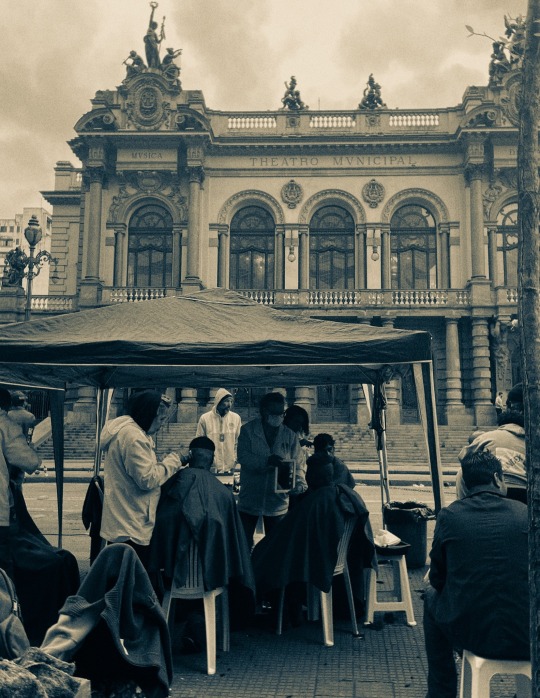
Black man getting haircuts by volunteers of social action of solidarity bath for homeless people and their pets in front of the Municipal Theatre of São Paulo, one of the landmarks of the city for its architectural value and historical importance.
Sunday on the 27th day of August 2023 at Praça Ramos de Azevedo, City of São Paulo, Brazil.
#são paulo#accor group#novotel#hotel jaraguá#centro histórico#br#brazil#sp#brasil#streetphotography#social issue#social exclusion#city#building#urban life#shot on iphone#inequity#social inequality#urban#urban photography#urban landscape#cityscape#architecture#people#historic#cities#streets#poverty#capitalism#ph
1 note
·
View note
Quote
It isn’t hard to see why the prospect of liberal socialism would be appealing today. Liberalism remains in or near crisis, and vast numbers express discontent with the neoliberal status quo. At the same time, there are very good reasons to reject revisiting forms of authoritarian ‘real existing socialism’ and communism. Liberal socialism offers the prospect of combining respect for liberal rights, checks and balances on state power, and participatory democracy with socialist concerns for the equal flourishing of all in a sustainable environment, the extension of democratic concerns into the workplace and ‘private government’, and pushing back on plutocratic rule. It also philosophically aligns well with concrete democratic socialist and radical movements appearing in the US, Chile, Brazil and elsewhere that want radical economic change but align with liberal values. Whether liberal socialism can transition from being a theoretical tradition and become a popular political ideology is a hard question. But, in a world defined by growing anger at inequality and plutocracy, liberal socialism is worthy of our loyalty.
The case for liberal socialism in the 21st century
12 notes
·
View notes
Text

Jane Vanini, a committed militant of the MIR (Movimiento de Izquierda Revolucionaria), was a Brazilian revolutionary who arrived in Chile in 1971, seeking asylum from the brutal dictatorship that reigned in her homeland. Before her time in Chile, Vanini had been an active member of the Ação Libertadora Nacional (ALN), a militant group dedicated to combating Brazil's military dictatorship. Her life was marked by her unwavering dedication to the fight against oppression and her belief in a liberated, equitable society.
Upon her arrival in Chile, she quickly integrated into the MIR, where she became an integral part of its revolutionary activities. She also worked as a secretary for Revista Punto Final, a publication known for its courageous opposition to fascism and its support for leftist movements. Jane's commitment to the cause made her a key figure in the Chilean resistance during a period of immense political turbulence.
On December 6, 1974, at just 29 years of age, Jane Vanini’s journey reached its tragic end. She was cornered in her home in Población Lorenzo Arenas, in Concepción, by armed forces of the Navy, who intended to capture her. True to her revolutionary ideals, Jane refused to surrender. In a fierce act of defiance, she fought back, firing at her attackers in a desperate bid to resist. Her courage was not enough to overcome the overwhelming force of her enemies. Jane fell in combat, her resistance marking her as both a symbol of unyielding bravery and the high cost of fighting for freedom.
The aftermath of her death was shrouded in the same shadow of brutality and secrecy that characterized Pinochet's dictatorship. Jane’s body was taken away to an unknown location, leaving behind a haunting silence and unanswered questions for decades. It was not until May 2005 that her mortal remains were finally located, bringing a measure of closure to those who had sought to honor her memory and her sacrifice.
Jane Vanini remains etched in the annals of revolutionary history, a woman who lived and died for her ideals. She stood as a bulwark against the tide of fascism, her life a testament to the global fight against dictatorship and oppression. Her name continues to inspire generations of activists, her courage a reminder of the sacrifices demanded by the pursuit of justice.
In eternal memory, Jane Vanini.

The Letters of Jane Vanini During her time in exile in Chile from 1971 to 1974, Jane Vanini kept in touch with her family and friends in Brazil through writing. Over this period, she wrote 37 letters, detailing the challenges she faced living in secrecy, especially as a woman in a predominantly male environment marked by political repression. In these letters, Vanini expressed her anguish, anxiety, hopes, and longing for her homeland.
In some letters sent to her nephew, she explained her desire to change Brazil's reality and its social inequalities, justifying why she was fighting against the dictatorship. At the end of one such letter, she affirmed her lifelong commitment to justice and equal rights:
"(...) One day, they called me a communist because in the newspaper A Voz do Aluno (The Voice of the Student), I complained about the rising prices of milk and meat, which many people could not afford, despite these being basic foods for good nutrition. Later, I learned what communism was and that to reach communism, a long stage called socialism was necessary. I discovered that many countries were already socialist: the Soviet Union, China, North Vietnam, Korea, and many others. Most importantly, I learned that here in Latin America, there was a country that was an example of socialism: Cuba. Cuba, like the others, achieved socialism by fighting with weapons in hand — the entire population — against the privileged minority who had everything, and the army that defended those privileged. And so, like many other comrades, I decided to fight to establish socialism in Brazil (...)."
Exile was the only way for Jane and many other Brazilians to escape oppression, being banished from their own lives to stay alive. Forced to leave her homeland, her clandestine life abroad transformed her vision of Brazil. She expressed this in a letter to her godmother (undated):
"(...) You might wonder why I am abroad if I care so much about Brazil. I'll explain: We belong to a continent generally referred to as Latin America. This entire Latin America shares the same racial origins as us Brazilians, speaks a very similar language, and shares the same roots. We suffer from the same ailments: illiteracy, hunger, premature aging, rotten teeth, and most importantly, we have the same fundamental enemy: the Yankee. It is the North Americans who exploit all our riches: oil, copper, coffee, cattle, gold, culture, fruits — everything. And the North American does not exploit us for free. Our governments pay them to exploit our mines, our workers, our culture, to take raw materials to the U.S. at dirt-cheap prices and export them back as finished products, like soluble coffee, machinery, and so on, at exorbitant prices. Meanwhile, they keep their wealth in reserve in the U.S. When we, the underdeveloped, have nothing left to offer, they will still have their own resources. Us? What do we matter, as inferior beings, half-developed monkeys, who only mimic the customs of superior peoples? I am Latin American and love equally the mestizo, the Creole, the Indian, the Black, the Asian, and the White who make up our heritage. My siblings are all Latin Americans, and for them, I am willing to give the only thing I truly own: my life. Once a person sees what I have seen and makes the decision I have made, they own nothing but the desire to change everything, no matter the cost. As a Latin American, it is the same for me to be in Chile, Brazil, Venezuela, Mexico, Bolivia, or any other country because every liberated country hastens the freedom of others. Every liberated territory is a front to continue fighting (...)."
Art historian Laurent Jeanpierre (2008) noted that despite constantly moving between these two worlds, Jane Vanini could not truly cross into either. She lived in a liminal space: captivated by Chile's landscape and the dream of a socialist government but deeply connected to her Brazilian roots — its food, fruits like mangoes and cashews, as described in a letter to her godmother, signed by her alter ego Ana, dated June 12, 1973:
"[...] Don’t forget my recipes. Sometimes I want to make a cake or Brazilian food, but I don’t know any recipes. The only thing I’ve learned to make (and it’s delicious) is feijoada. But it’s missing kale and flour, which don’t exist here and are unknown. I miss mangoes, cashews, and papayas, as these fruits don’t exist here. Send me a bottle of cachaça, okay? [sic] It doesn’t exist here because sugarcane doesn’t grow. We have grape and apple chicha instead, which is delicious, but it’s not the same."
By 1973, Jane had met her second husband, journalist José Tapia Carrasco, and disclosed her new romance to her family in just two lines:
"Now I want to tell you something I’ve been ‘hiding’ for a year and a half. After I separated from Sergio, I got married again. José (Pepe) and I have been living together for a year and a half. We think alike and do the same work."
Throughout her clandestine time in Chile, Jane's family was under constant surveillance in Brazil. Her sisters were forced to testify to the Operação Bandeirante (Oban), a military intelligence center, and her apartment was raided by the government. In a letter to her nephews, she raised their awareness of the censorship and repression they lived under:
"(...) As we were winning, the ease of things made us complacent. Meanwhile, the Yankees began paying people to torture revolutionaries. Many comrades could not withstand the brutal torture and talked, leading to others falling. That’s how we got to where we are now. But history does not die. One day, the people will again understand it’s time to fight, and we will fight until we win. That’s why I am far from you now... I am sentenced to five years in prison, in addition to tortures that aren’t reported in the newspapers or in my sentencing (...)."
#chile#marxism-feminism#Movimiento de Izquierda Revolucionaria#Ação Libertadora Nacional#marxism leninism
56 notes
·
View notes
Text
i usually don't talk about personal stuff, but, since i'm still waiting for the public university that i get my free therapy from to clarify whether the program continues or not, this is a rare venting post ig...
well, earlier today i attended the funeral of one of my paternal aunts.
she died yesterday, and we got the news late at night.
as it's common for many working class Brazilian families, there are, like, 4 houses in the same terrain that belonged to my late grandpa, so, we all sort of lived together, and it was a huge shock for all of us.
other relatives, who live in the same town as us, also appeared to show support.
i overheard a cousin of mine (who is younger than me and recently lost her own mom to breast cancer, which just shows how strong she is to come back to the place she grew up to support the remaining aunts, one of which is her grandma) saying this aunt died of pulmonary embolism, after she was diagnosed with pneumonia last week.
my dad also said something earlier this week about lung damage, if i remember correctly.
me and my big sis, we suspect that this aunt either got covid or was suffering from the consequences of long covid, since she was looking weaker and more fragile in the past 2,3 years or so.
but, since the health unit she was admitted has a pretty basic infrastructure, as it's common for small towns here, we might never know for sure, bc we don't even know if it occurred to the doctors to get her tested...
i wasn't particularly atached to her, but it's still very painful, bc, with the terrain thing i said above, i still grew up with her and she was a psrt of my childhood...
but, most of all, it's particularly painful bc of the son she left.
he has down syndrome, but, as it's also common for the lives of working class ppl here in Brazil and i assume South America in general, he never had access to the type of multidisciplinary healthcare support that he needed and is a person with high support needs, which means he depended on his mother for almost everything.
in the days she was still at the health unit -- which can't be called a hospital, bc it's this type of unit we call here "unidade de pronto atendimento" and serves to provide medium complexity healthcare -- he frequently asked to my other aunts and relatives when his mom would come back.
he is not completely abandoned, since my other aunts, who helped said aunt to take care of him, are still alive and will take care of him, which is a relief ofc...
but they are also elderly women, and way older than his late mother.
and, most of all, it's been devastating way beyond words to hear the poor guy crying and having panick attacks as these aunts and my other relatives tried explaining to explain to him that his mom won't come back to go to church with him ever...
bc, really, there are no words to describe how terrible it all is...
it's also a pretty average working class Brazilian experience, as you guys can see by the stuff i mentioned above...
and, i don't even know what's the takeaway from this story i'm telling...
i guess it's just to give an insight of what life here in this country can be, you know, besides all the venting and stuff...
(and, YES, i know that other countries on the Global South still got it worse.
in fact, even here in Latin America.
it's just that it's still fucking terrible that we have to endure this type of stuff every day bc of economic inequality and other social issues)
maybe it's just a reminder that life and death are way bigger than all of us idk...
just a reminder of one of those "remember you are mortal" moments that life throws at us sometimes...
yeah, sounds about right.
#this was a rare venting post#maybe i'll delete this later#personal post#cw death#cw grief#south american problems#brazil
3 notes
·
View notes